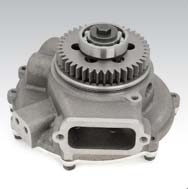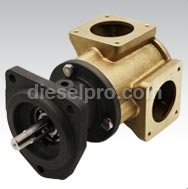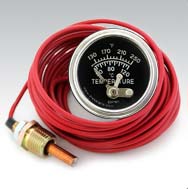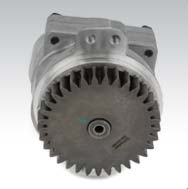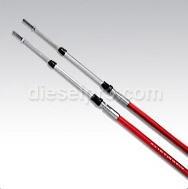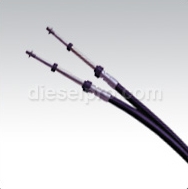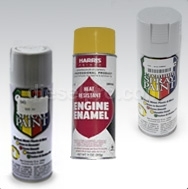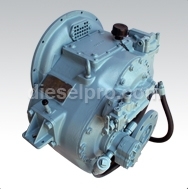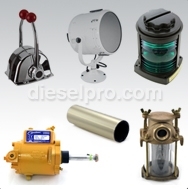The Caterpillar C12 is a 6-cylinder, 11.9-liter diesel engine built for heavy-duty applications across marine, industrial, construction, and power generation sectors. First introduced in the late 1990s, the C12 succeeded the 3176 and 3196, offering improved durability, electronic control, and emissions compliance. It was later replaced by the Cat C13, but the C12 remains widely supported in the aftermarket and repower markets. Built on Cat’s early ACERT (Advanced Combustion Emissions Reduction Technology) platform, the C12 delivers high torque, fuel efficiency, and excellent load response under continuous-duty cycles. The engine’s balance between power output and physical size made it popular for use in vessels, industrial machinery, and mobile equipment worldwide. The C12’s combination of strong mechanical architecture and electronic controls (via ADEM III or ADEM IV) enables effective operation in high-demand environments, while its support infrastructure continues to make it a go-to engine for repowers, marine operators, and export users. Specification Details Engine Configuration Inline 6-cylinder, 4-stroke diesel Displacement 11.9 Liters (726 cubic inches) Bore x Stroke 130 mm x 150 mm (5.12 in x 5.91 in) Aspiration Turbocharged and Aftercooled Compression Ratio 17.0:1 Fuel System HEUI or Common Rail (electronic) Horsepower Range 340 – 505 HP (254 – 377 kW) @ 2,100–2,300 RPM Peak Torque Up to 1,650 lb-ft (2,237 Nm) @ 1,200–1,600 RPM Emissions Compliance EPA Tier 2 / EU Stage II / IMO I Aftertreatment None required (Tier 2) ECM System ADEM III / ADEM IV Electronic Control Cooling System Heat exchanger or radiator cooled (marine/industrial) Dry Weight ~2,400 – 2,600 lbs (1,090 – 1,180 kg) Oil Capacity 40–48 liters depending on sump configuration Fuel Consumption ~0.34–0.36 lb/hp-hr depending on load The Caterpillar C12 engine was developed to serve in a variety of demanding applications, from marine propulsion and auxiliary power to industrial duty machines and mobile generator sets. Its versatility and continued aftermarket support make it a common repower and rebuild candidate today. One of the most widely adopted roles for the C12 is in the marine industry, where it serves as both a main propulsion engine and an auxiliary generator drive. High-speed sportfishing yachts Crew boats and pilot vessels Small ferries and commercial passenger boats Patrol boats and coastal defense craft Commercial fishing vessels (trawlers, crabbers, seiners) With outputs up to 505 HP, the C12 allows boats to maintain cruise speeds at lower RPMs, increasing fuel efficiency and engine life. The electronic engine control also ensures smooth acceleration, improved idle control, and integration with modern vessel monitoring systems. Marine generator drives (150–250 kW output range) Fire pumps, winch power, and deck equipment drives Hydraulic systems for dredging or mooring operations Refrigeration compressors or blower systems on ships The engine’s heat exchanger cooling configuration supports closed-loop marine cooling without exposure to corrosive raw water. The C12 is commonly used in stationary and trailer-mounted generator sets, where consistent mid-range output and emissions compliance are necessary. Standby and emergency power (200–300 kW range) Prime power for construction, telecom, or off-grid camps Export gensets to Tier 2 or Tier 0 markets Military base backup systems Agricultural and commercial farm power stations Its reliability in continuous-duty cycles makes it ideal for high-demand genset configurations, particularly in areas where Tier 2 compliance is sufficient or where no Tier enforcement exists. Though not as commonly integrated into modern Tier 4 machines, the C12 has been widely used in construction and industrial machinery, especially prior to emissions enforcement. Wheel loaders and large dozers Mining support equipment and blast-hole rigs Hydraulic cranes and reach stackers Stationary compressors and air-handling systems Skid-mounted drilling rigs or water pump units Its torque output and ability to handle load fluctuations make it well-suited for highly variable operational environments, such as mining or infrastructure construction. In the energy sector, the Caterpillar C12 is a trusted engine for power modules and hydraulic systems operating in oilfields, pipeline projects, and refineries. Hydraulic fracturing pump drives Mud pump skids Coil tubing injector power Oilfield gensets for trailers and mobile camps Portable natural gas compressor modules Because it does not require aftertreatment (in Tier 2 form), the C12 is valued in regions where fuel sulfur content may be high or DPF service is impractical. The Caterpillar C12 is especially active in the aftermarket repower sector, where its physical dimensions, support infrastructure, and durability make it an excellent fit for equipment originally powered by older Cat or Detroit Diesel models. Replacing older Cat 3176, 3196, or 3306 engines Upgrading marine propulsion systems in commercial boats Export of power modules for telecom or utility clients Rebuilding legacy gensets to restore Tier 2 compliance Refurbishing heavy machinery for fleet modernization Its wide torque curve, electronic integration options, and proven reliability under extreme loads make it one of the most repurposable mid-range engines in the Caterpillar portfolio. The Caterpillar C12 engine delivers the right mix of durability, power, emissions flexibility, and serviceability, making it a mainstay in marine, industrial, and generator markets. Whether operating as a propulsion engine on a coastal ferry or as the heart of a construction site genset, the C12 continues to perform reliably in challenging conditions. Its broad horsepower range, Tier 2 compliance, and robust aftermarket ecosystem make it a smart choice for repower projects and equipment rebuilds—especially in regions and industries where Tier 4 Final systems are either impractical or unnecessary. Marine CAT C12 Coolant System Specific Component Maintenance Life
Parts For Caterpillar C12
-
Select Parts Category
 Loading...
Loading... Engine Specifications & Applications of the Caterpillar C12 Engine
Overview of the Caterpillar C12
Caterpillar C12 Engine Specifications
Applications of the Caterpillar C12 Engine
1. Marine Propulsion and Auxiliary Power
Marine Propulsion Use:
Auxiliary Marine Applications:
2. Power Generation Systems
Generator Applications:
3. Construction and Industrial Equipment
Common Machines:
4. Oilfield and Energy Sector Use
Energy Applications:
5. Repower and Export Projects
Repower Scenarios:
Conclusion
Additional Resources



 Free US Calls: 1-888-433-4735
Free US Calls: 1-888-433-4735 International: 305-545-5588
International: 305-545-5588






